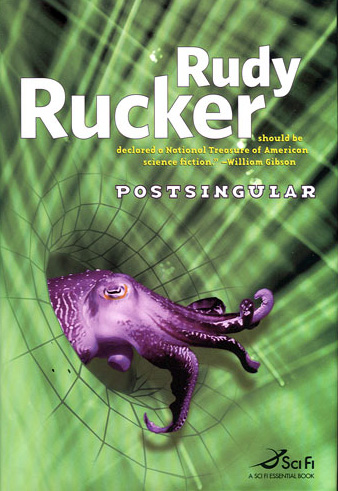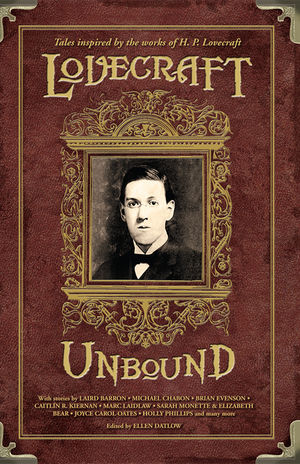Archive for the ‘Books’ Category
Grinding to Valhalla Interview
My blog was disabled when this interview came out, so here is a belated link. It’s one of the more enjoyable ones I’ve done in a while. A little bit of everything is covered, from games to Lovecraft. That’s pretty much the gamut, right?
Childrun in Year’s Best Fantasy 9
Year’s Best Fantasy 9, edited by David Hartwell and Kathryn Cramer, is available now, but not in stores. This is Tor.com’s first publication, and exists as a POD-only venture to be followed shortly by an ebook. It’s 475 pages, priced accordingly, available direct from Tor and from the usual Amazonian marketplace. I think the POD model is an interesting one for books, especially when they have the full force of a professional publisher behind them (good editors, skilled proofreaders, experienced production staff, etc.). This bodes well for the future.
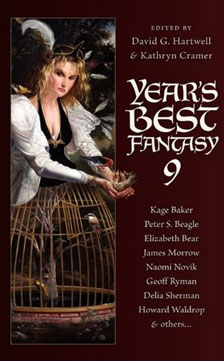
Hugo Winners
The 2009 Hugo Award winners were announced this evening. For a change, I’ve read most of the winners, and they are all quite deserving. When the finalists were announced, I commented that Gaiman’s The Graveyard Book is the one most likely to still have a steady reading audience a 100 years from now. It’s that sort of book. I especially enjoyed Gaiman’s own reading of it in the audiobook version.
Gord Sellar was up for the John W. Campbell Award for Best New Writer this year, but didn’t win…however, I think he gets another shot at it next year, so I will go back to rooting for him at that time.
BOOKS OUR PARENTS GAVE US (or Forbade)
[This was written a few months ago…just came across it and realized I’d never posted it.]
I just gave my oldest daughter a copy of Carrie. I guess I want her to connect to a strong stream of pop horror; I’m curious whether the book can still grip a modern teenage reader more recently under the thrall of Stephanie Meyers. Whether she’ll read it or not, I don’t know. We’ll see. This reminded me of the influence of parental reading and recommendations on my own development as a reader…and a writer.
What really spurred this line of thought is the fact that I’m finally reading Deliverance. I saw the movie, of course—and I saw it in the theater when it first came out. But I already had strong impressions of the movie before I saw it, and they were received not from Hollywood, not from the previews, not from kids at school talking about the film—but from my mother. When the book came out in 1970, it was a best seller. My mother read it sometime in the early 70s, and I still her excitement as she tried to convey the scene in which the narrator of the story climbs a sheer rock face. I got such a vivid impression of that scene—the intensity of description, the fact that this terrifying climb stood for something deeper than the action itself–that nothing in the movie could rival it. In fact, I’m a bit wary of getting to that point in the novel, because I’m afraid it will never compare to what I’ve imagined it to be for nearly 40 years now. All the urgency came from my mother’s exhilarated attempt to describe what in the writing had excited her…and that scene I’ve never read has stayed with me and lurked as a significant force in my picture of what writing can mean, what it can do and convey to a reader, ever since. I’m reading Deliverance, but I’m not there yet. Soon I’ll know if this long-held memory will dissipate, if the influence of the unread Deliverance will end up paling by comparison to the actual Deliverance. But for now I’m in a state of suspense between the imagined narrative and the real one. It’s an interesting place.
My parents’ reading had a strong influence on my own reading. I’m curious about the experience of others in this regard. I think a lot of readers might find the taboo books to have been the most influential: Were there books your parents forbid you to read, that you sneakily devoured in secrecy? Were these more powerful reading experiences because of the taboo, or were you disappointed? My mother only ever prevented me from reading one book: The Exorcist. I had read a few chapters (again, in the early 70’s, at the height of Exorcist excitement—as the book was a huge bestseller and the movie was everyone’s obsession, impossible for a horror-oriented kid like myself to ignore) when she noticed me reading it. She had read it already and apparently something in there triggered her feeling for the first (and only) time that she should impose limits. I had already reached a description of a sexually violated Virgin Mary, without quite understanding what I was reading; and when I finally read the book much later, as an adult, the parts I found most interesting were the scenes of Father Karras’s research in the Catholic library (a purely literary passage that, unsurprisingly) never made it into the movie. But far more important than the book(s) she banned were the ones she read and tried to relate.
When I was very young, she read Lord of the Rings, and occasionally she would read passages to my brother and I while we were heading off to sleep. I’ll never forget The Mines of Moria, starting at the gate and the attack by the lurker in the waters, ending with the escape into light—though I scarcely knew who Gandalf was at the time. Then she read of Merry and Pippin’s time with Treebeard. I had no idea that these stories were taken from LOTR. When I read the books myself a few years later, there was a shock of discovery and disorientation as I realized that the scenes I was reading were the same ones I had heard…
More influential was The Martian Chronicles, as it served as my first impression of science fiction. I remember my mother telling me of a book she was reading, where the characters stroked the pages of a book and it spoke its stories to them. This was “Ylla.” I begged her to read me the whole story, and then lay claim to the copy of The Martian Chronicles she was reading—a Times edition trade paperback that eventually Ray Bradbury himself signed, and which I still treasure.
The other powerful literary influence in our house was the biggest bookcase itself—holding mainly the strange books my father had acquired, both from childhood (himself a bookish boy, I suspect) and in the course of required college reading. Some of these I fetishized: There was a book about biology, which included photographs of medical horrors as well as drawings of enormous carnivorous plants; another which taught introductory astronomy under a thick veil of fiction, following the spaceship journey of several kids through the solar system. I will never forget an illustration of the sweltering pilot pulling back hard on the handbrake to prevent the ship from plunging into the sun! But then there were the unillustrated books whose titles alone fascinated me: The Magic Mountain, which became crosswired in my mind with both The Big Rock Candy Mountain and the mountain that opened up to swallow the children who followed the Pied Piper. When I finally read The Magic Mountain, at around age 20, it was a strange and significant experience partly because this was a book I had studied from afar for many years before finally approaching.
My father never prevented me from reading a book, although unlike my mother, he did not quite appreciate my childish tastes, and rarely recommended anything that appealed to me immediately—with one exception. He bought me odd books for gifts—things with titles like Miscellany. Exercises in short fiction that lacked the weird or horrific angle that was all important to me. Later he gave me collections by Updike and Welty when I was old enough to appreciate them. But the one major influence he had on my childhood reading was Poe—both literary enough to satisfy his academic leanings, and lurid enough to appeal to me. My brother and I cowered under our covers on the nights he put us to sleep with “The Telltale Heart,” “The Black Cat,” “The Pit and the Pendulum.” These few nights of reading warped my imagination permanently. I took to writing Poe-esque tales, always featuring bloody daggers and vengeful spirits and hotels with haunted Room 13’s. (The dagger itself was a direct steal from another of my father’s books—a huge complete works of Shakespeare, whose frontispiece was a scene from Macbeth, with a horrified Macbeth contemplating a dagger floating eerily in mid-air darkness.)
Finally, there was one book on which my parents had an equal influence. I don’t remember who started it first, but at some point in the late 60’s, they began reading Catch-22 together. I remember them talking about it, reading their favorite passages to each other, howling with laughter. When I read the book myself, in junior high school, I continually tripped across passages they had read out loud: The one that stands out, blurred by years but still partially intact, involved the painting of a patient’s toes with mercurochrome or merthiolate. I don’t remember why it was funny, but I remember them laughing together, sharing the book with each other. And in an unintentional way, sharing it with me.
How about you? Feel free to share stories in the comments.
The Big Box of Wonders
Tonight at Fantagraphics in Seattle, a wonderful event: Paul di Filippo appeared with Jim Woodring (see his website on the blog’s sidebar) to read from Cosmocopia, which you can buy here (in a limited edition of 500 copies). Cosmocopia is a novel inspired by Woodring’s art, accompanied by some of said art, including a 500 piece Woodring jigsaw puzzle.
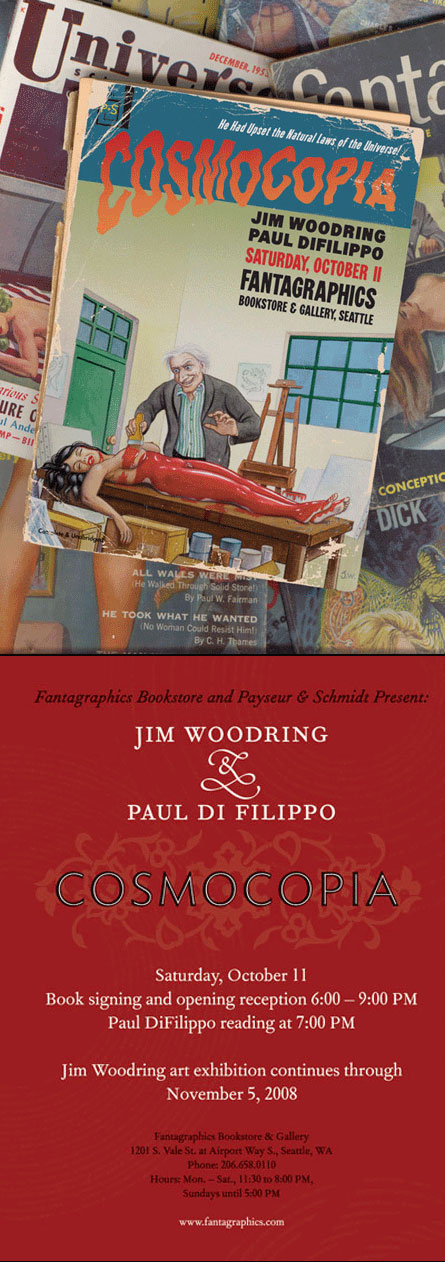
I have known Paul for many years, but we have never met in person. Years ago, he circulated a small zine called Astral Avenue, and I began to bury him in correspondence, little knowing how well Paul would rise to the challenge. For many years, I would receive one or two envelopes a week from Paul, each one heavily and lovingly collaged, and full of weird ephemera he’d scoured from the antique stores and garage sales of Providence. We eventually appeared in Mirrorshades together, and collaborated on a short story about the photographer Weegee (“Sleep is Where You Find It” aka “The Human Head Cakebox Murders”), and even tried to get a collaborative novel off the ground. Weirdly, with the advent of email, we corresponded less. When I lived on Long Island in 1988, we spoke on the phone once. We’d never met in the flesh until tonight. So to meet Paul and Jim Woodring, one of my artist heroes…in a shop crammed with Fantagraphics’s amazing creations…it was quite a night. Followed by huge amounts of great food, hilarious conversation and Hard Corn Poneography at Hing Loon. As an extra bonus, I met Max Woodring, who it turned out I’d already run into at the Gage Academy a few months ago. So it was a night packed with import and sure to give rise to significant strange events somewhere up ahead and unforeseen. I can’t wait to read Cosmocopia–and one of these rainy nights, maybe I’ll tackle the puzzle as well.
The World Without Me
I just finished listening to an audiobook version of The World Without Us. Sometimes it was exhilarating, more often so depressing that I finished my commute in the mood to just kill myself and mark on my headstone, “Let the healing begin!” If you find visions of apocalypse compelling, and love your dreams laced with ecodeath and dystopia, you love this book. Actually, I thoroughly enjoyed it. It’s full of paleoarchaeology, looking at the world before us as well as the world after us, and quite a bit of science fictional thought experimentation. If you can get past the chapter on plastic, there is the occasional spark of hope–or anyway, of color.
J.G. Ballard: Conversations
RE/Search Publications has been publishing amazing books for years, works by and about Charles Willeford, William Burroughs, Survival Research Laboratories, punk culture, urban primitives, the list goes on and on. Their early book on J.G. Ballard had a huge influence on me, probably being the biggest single spark to my first novel, Dad’s Nuke (along with the simple fact that I was stewing in the grey elevated bowels of Pacific Gas & Electric). Of only slightly lesser impact, their hilarious Pranks. Today, I received, courtesy of RE/Search founder V. Vale, a copy of their latest Ballard book, J.G. Ballard: Conversations. A fat collection of Ballard interviews, full of those bright meaty nuggets that spark complete psychic rearrangements and little things like, oh, novels. Many thanks, Vale. I hope this link brings you at least one lucky new soul who had never before known of all the treasures stored at RE/Search.
Why Dickens Still Rules
From A Tale of Two Cities:
“His message perplexed his mind to that degree that he was fain, several times, to take off his hat to scratch his head. Except on the crown, which was raggedly bald, he had stiff, black hair, standing jaggedly all over it, and growing down hill almost to his broad, blunt nose. It was so like Smith’s work, so much more like the top of a strongly spiked wall than a head of hair, that the best of players at leap-frog might have declined him, as the most dangerous man in the world to go over.”
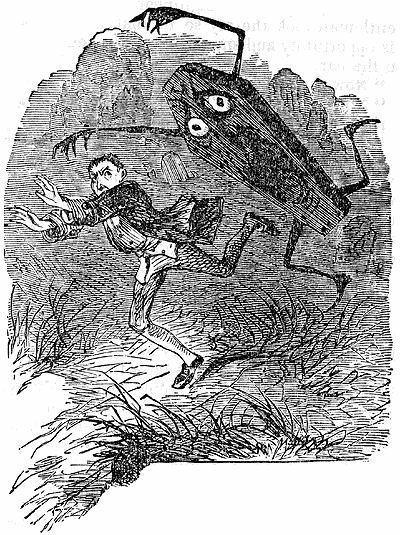
Plus, the nightmarish pursuit of young Cruncher by coffin.
Postsingular Post
Rudy Rucker has just released his wonder-filled new novel, Postsingular, for free download. I’m reading the shiny hardcover edition, but no one will begrudge you reading it any way you can.
